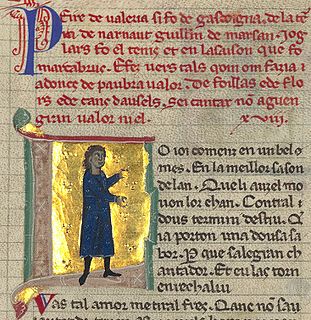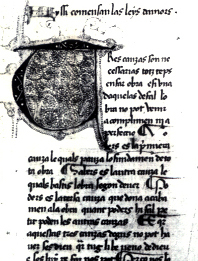
Peire Cardenal was a troubadour known for his satirical sirventes and his dislike of the clergy. Ninety-six pieces of his remain, a number rarely matched by other poets of the age.
The sirventes or serventes, sometimes translated as "service song", was a genre of Old Occitan lyric poetry practiced by the troubadours.
A tenso is a style of troubadour song. It takes the form of a debate in which each voice defends a position; common topics relate to love or ethics. Usually, the tenso is written by two different poets, but several examples exist in which one of the parties is imaginary, including God, the poet's horse or his cloak. Closely related, and sometimes overlapping, genres include:

Pons de Capduelh was a troubadour from the Auvergne, probably from Chapteuil. His songs were known for their great gaiety. He was a popular poet and 27 of his songs are preserved, some in as many as 15 manuscripts. Four of his cansos survive with musical notation.

The (Lo) Monge de Montaudon, born Pèire de Vic, was a nobleman, monk, and troubadour from the Auvergne, born at the castle of Vic-sur-Cère near Aurillac, where he became a Benedictine monk around 1180. According to his vida, he composed "couplets while he was in the monastery and sirventes on subjects that were popular in the region."

Peire d'Alvernhe or d'Alvernha was an Auvergnat troubadour with twenty-one or twenty-four surviving works. He composed in an "esoteric" and "formally complex" style known as the trobar clus. He stands out as the earliest troubadour mentioned by name in Dante's Divine Comedy.

Daude, Deude, Daurde, or Daudé de Pradas was a troubadour from Prades-Salars in the Rouergue not far from Rodez. He lived to an old age and left behind seventeen to nineteen cansos, including twelve on courtly love, three about sexual conquest, one tenso, one planh, and a religious song. Only one melody of his entire oeuvre has survived.

Aimeric de Belenoi was a Gascon troubadour. At least fifteen of his songs survived. Seven others were attributed to him in some medieval manuscripts.
Bertran d'Alamanon, also spelled de Lamanon or d'Alamano, was a Provençal knight and troubadour, and an official, diplomat, and ambassador of the court of the Count of Provence. Twenty-two of his works survive, mainly provocative tensos and sirventes, many dealing with Crusading themes.

Peire de Valeira, Valeria, or Valera was a Gascon troubadour. Since troubadour poetry probably originated in northwest Aquitaine and first spread—within a generation—south into Gascony, Peire was one of the earliest troubadours. Only two of his poems survive, one canso and one cobla.

Peire Raimon de Tolosa was a troubadour from the merchant class of Toulouse. He is variously referred to as lo Viellz and lo Gros, though these are thought by some to refer to two different persons. On the other hand, lo Viellz could refer to his being of an early generation of troubadours. Eighteen of Peire Ramon's poems survive, one canso with a melody.

Peire Guilhem de Luserna was a Piedmontese troubadour.

Bernart de Venzac was an obscure troubadour from Venzac near Rodez in the Rouergue. He wrote in the Marcabrunian style, leaving behind five moralising pieces and one religious alba. Two of his works were confused by copyists with those of Marcabru in some manuscripts.

Peire Bremon lo Tort was a troubadour from the Viennois. Though only two of his pieces survive, his poetry is characterised by Francoprovençalisms. According to his short vida, he was "honoured by all the notable men."

Salh d'Escola was a troubadour from Bergerac in the Périgord, a former province of France. The meaning of his name, also spelled Sail or Saill, uncertain; it may be an unusual given name. His surname, likewise, may be a family name, but there is no known location called "Escola" that could render it a toponymic. The entire name may be a nickname meaning "defector from school" or "escapee from the cloister", indicating that he quit his education, either in a school or a monastery. On the other hand, it may signify a pedant.
Uc de Lescura or de l'Escura was a minor troubadour. The Lescura of his birth is unknown. There is a Lescurre in Ariège, Aveyron, and Tarn. Based on references in his work, historian Alfred Adler placed him at the court of Alfonso VIII of Castile and in Catalonia.

The Consistori del Gay Saber was a poetic academy founded at Toulouse in 1323 to revive and perpetuate the lyric poetry of the troubadours.
Guilhem d'Anduza was a minor troubadour active in the middle of the thirteenth century. He belonged to the family of the lords of Anduze, who were patrons of several other troubadours.

The 2019 European Parliament election in Italy were held on 26 May 2019, electing members of the 9th Italian delegation to the European Parliament as part of the European elections held across the European Union.














